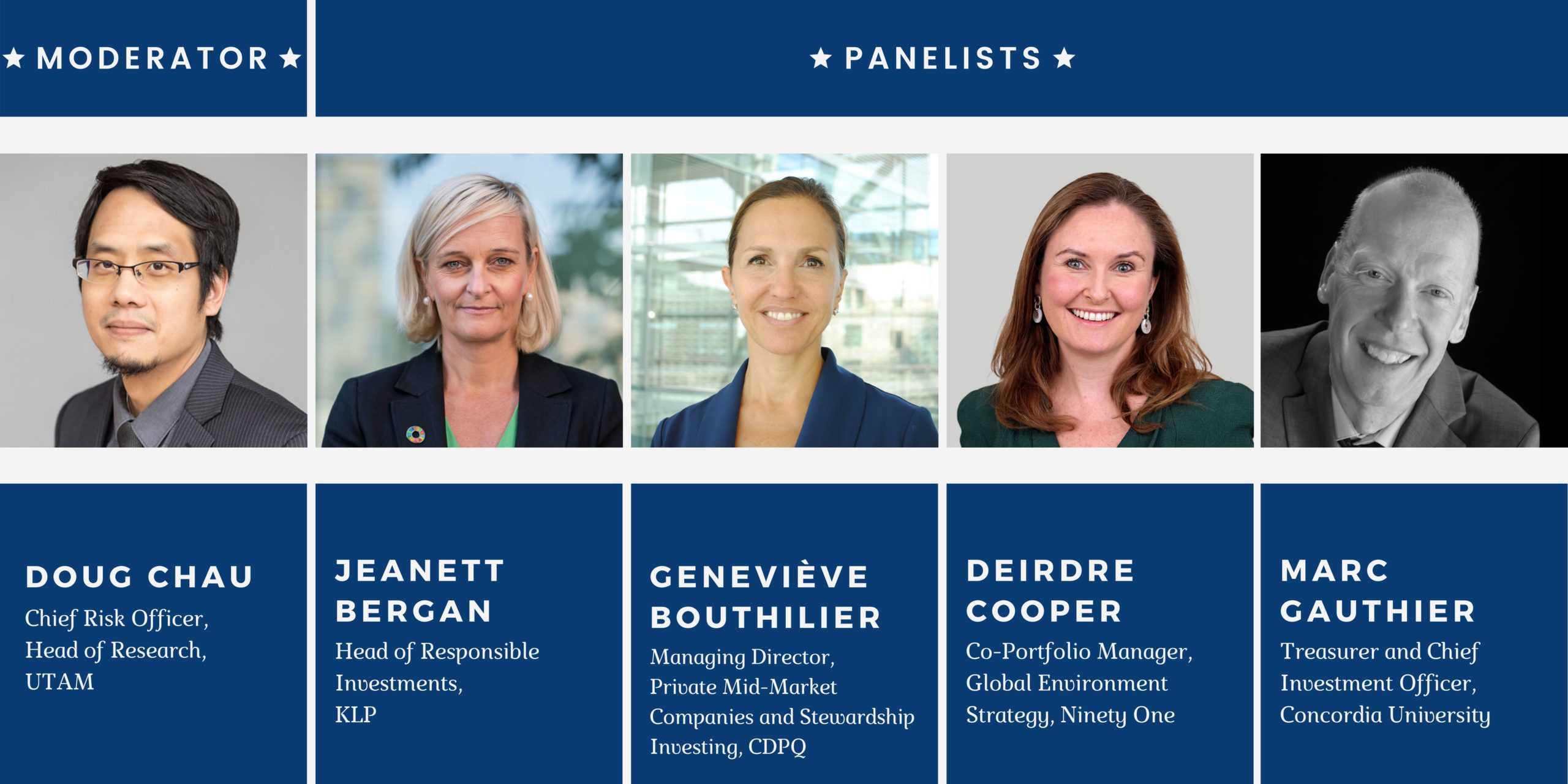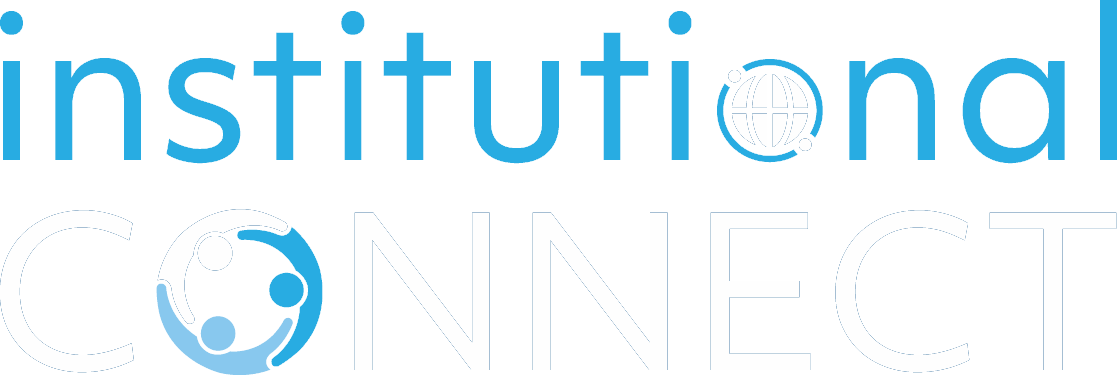Sustainable Investing panel discussion
On October 22, a panel of five senior level speakers, from both Canada and around the globe, discussed sustainable investing approach at Institutional Connect Virtual Forum. Discussion topics ranged from metrics to divestments vs. engagements. Below are some of the discussion highlights:
Speakers include:

The panel started with firms’ approach towards sustainable investing, using metrics and TCFD implementations. Marc Gauthier explains that Concordia University’s approach addresses sustainability in 4 quadrants: research knowledge, operations, finance and investments. It is the first university to issue sustainable bonds as a result of capital adjustment process. Within university’s foundation, responsible investing and impact investing policies have been developed. The responsible investing is using 3-dimensional reporting structure while on the impact investing side, as the metrics can only be in place when the impacts are being made, a reverse process is under way to establish the metrics.
CDPQ has 4 pillars to sustainable investing strategy, Geneviève Bouthilier shares. They include: factoring climate change into every investment decision; Increasing low carbon investments by 80% between 2017 – 2020; Reducing carbon intensity invested dollar by 25% between 2017 – 2025; Exercising stronger climate leadership industry and within portfolio companies. Besides, it is in the culture of the company and every employee at CDPQ has a climate target compensation. The organization is using TCFD recommendations to identify opportunities in each sector.
CDPQ has 4 pillars to sustainable investing strategy, Geneviève Bouthilier shares. They include: factoring climate change into every investment decision; Increasing low carbon investments by 80% between 2017 – 2020; Reducing carbon intensity invested dollar by 25% between 2017 – 2025; Exercising stronger climate leadership industry and within portfolio companies. Besides, it is in the culture of the company and every employee at CDPQ has a climate target compensation. The organization is using TCFD recommendations to identify opportunities in each sector.
Ninety One’s Deidre Cooper shares that her organization has been working to understand a company’s extranalities, as well as work with portfolio companies to allocate more toward positive. TCFD’s recommendations have been helpful in understanding risk and opportunity, and identify climate opportunities. The organization is using a variety of data sources for them to be incorporated into fundamental analysis. Deirdre thinks it really important to view data in the context of the company’s culture and business model.
KLP, as Jeanette Bergan explains, is the largest pension fund in Norway. It passively invests 7000 companies in more than 50 countries and does a lot of impact investing in development countries. It also has set divestment criteria which has seen the organization exclude companies in coal and oil sands industries.
On COVID-19 disruption to the industry, Marc comments that previously the industry heavily focused on climate change. It was hard to find resources on social issues. COVID-19 pandemic has surfaced social aspect. CDPQ is doing more engagements than ever. It has created funds targeted for companies in Québec region. Ninety-One’s Deirdre Cooper shares that as the organization is a South Africa company, it has felt real impacts in Africa and launched $600 million South Africa recovery fund. Deidre is also positive on global regulatory developments this year, partly COVID related, which includes China’s president, Xi Jinping’s announcement of achieving net zero by 2060.
On divestments vs. engaging, CDPQ’s Geneviève shares that divesting is seen as the last resort as it would mean giving up influence. When engaging portfolio companies, influence can be exercised through dialogue and shareholder voting rights. KLP’s Jeanett illustrates that divesting, integration and active ownership work together. The company sees divestments can create change. One example is that one of the biggest shipping companies, Evergreen, has been excluded because of their activities on the beaches of Asia. The company has since then engaged KLP because they want to get off the exclusion list. Ninety One’s Deirdre Cooper is using a combination of both, through divesting and reallocating capital positively. In the process of divesting, Deirdre comments, that they would work with the company on how to get back onto the list and thus create positive impacts.
On COVID-19 disruption to the industry, Marc comments that previously the industry heavily focused on climate change. It was hard to find resources on social issues. COVID-19 pandemic has surfaced social aspect. CDPQ is doing more engagements than ever. It has created funds targeted for companies in Québec region. Ninety-One’s Deirdre Cooper shares that as the organization is a South Africa company, it has felt real impacts in Africa and launched $600 million South Africa recovery fund. Deidre is also positive on global regulatory developments this year, partly COVID related, which includes China’s president, Xi Jinping’s announcement of achieving net zero by 2060.
On divestments vs. engaging, CDPQ’s Geneviève shares that divesting is seen as the last resort as it would mean giving up influence. When engaging portfolio companies, influence can be exercised through dialogue and shareholder voting rights. KLP’s Jeanett illustrates that divesting, integration and active ownership work together. The company sees divestments can create change. One example is that one of the biggest shipping companies, Evergreen, has been excluded because of their activities on the beaches of Asia. The company has since then engaged KLP because they want to get off the exclusion list. Ninety One’s Deirdre Cooper is using a combination of both, through divesting and reallocating capital positively. In the process of divesting, Deirdre comments, that they would work with the company on how to get back onto the list and thus create positive impacts.
On concluding, the panel shares advice for organizations that are beginning their ESG journeys. Besides investment requirements, ESG is a must have for HR retention purposes as younger generation is active in this move. Do not think of this as something difficult or advanced. In the process of implementing, listening and dialoguing are the key. As well, now is the time to do, as there are huge opportunities in the market and there will be significant risk for those who have not taken the steps to move into this initiative.
